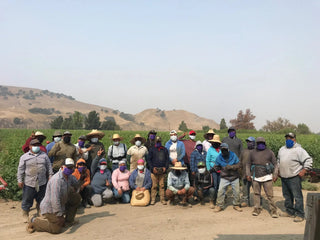Turned upside down
When the world came to a screeching halt in March, businesses across the country (and world) closed and boarded up their doors. Essential workers became more important than ever. Doctors, nurses, delivery workers, drivers, farmers, farm workers, and millions more showed up day in and day out to provide the essential needs of our society, in the face of a roaring pandemic.
In April, Timbuk2 was able to reopen the San Francisco Factory in the city’s Mission District, to produce masks for essential workers. Through a partnership with NBC Sports Bay Area, and the local professional sport teams, Timbuk2 was able to turn donated t-shirts into non-medical face masks, for local redistribution to those most in need.

We reached out to our community, and the community reached back! We received inquiries from our neighbors who wanted to help us sew up, box up and ship out the masks. We even received a note from a fan who had a t-shirt company that went out of business years ago. He had thousands of t-shirts, and was holding onto them until he found the right thing to do with them. One rainy day, he loaded up his pickup truck and dropped them off at our Factory. About 5,000 masks were made out of those t-shirts.
One email really stood out. Across the bay, our friends at Fair Trade USA, were figuring out how to keep their farm workers safe from the spread of the pandemic. As essential workers, farmers across North America were working tirelessly to produce the food we all need. When Fair Trade USA heard what Timbuk2 was doing - they reached out.
Timbuk2 and Fair Trade USA partnered up to donate 5,000 masks to farmers, farm workers and their families to stop the spread of COVID-19, and keep this food supply chain functioning.

The world has been reminded of the fact that our food supply chains are essential. While vast segments of the global economy are shutting down, farmers are still working to make sure that supermarket shelves and homes are stocked with the fresh products we need to keep our families fed and healthy. Fair Trade USA is working to ensure that farmers have access to the benefits of Fair Trade, including health resources, labor protections, and secure income.
Fair Trade USA reached out to farmers and workers around the world to learn about their most urgent needs and how to best support them - including agricultural farms and dairies located in our very own backyard, here in the US, Canada, and Mexico. The need for personal protective equipment was a major concern.
The Impact
Thanks to this partnership, we sent 5,000 masks to farms and dairies in Arizona, California, Idaho, New York, Oregon, Washington, British Columbia, and Mexico. From office management to harvest workers, and their families, everyone is taking precautionary measures to ensure health and safety. They're putting their masks to great use!

To learn more about the effects on the pandemic on farms, factories, and fisheries around the world, listen to the Fair Trade USA Covid webinars.
ABOUT FAIR TRADE USA
With every purchase—from coffee to clothes—consumers can vote with their dollars for a fairer, more equitable world. Fair Trade USA imagines a world where farmers, workers, and businesses come together to produce food and create goods in a way that sustains people and the planet. As a 501(c)(3) based in Oakland, California, Fair Trade USA has made tremendous progress in advancing this vision since 1998. Today more than 1,300 businesses sell Fair Trade Certified products from more than 70 countries. The farmers, workers and fishers producing these goods have received more than $740 million in additional financial impact, which has been used to provide access to clean water, build new schools, develop health clinics and improve agricultural practices.
Fair Trade USA certifies farms, factories, and fisheries around the world that meet rigorous environmental and labor standards. For our agricultural work, produce harvested on fair trade farms is sold as Fair Trade Certified to retailers—such as Costco, Safeway, Kroger, and Whole Foods—who in turn sell that produce to consumers. In addition to receiving workplace benefits and protections, workers earn additional income from the fair trade program. For every Fair Trade product sold, the business selling it pays an additional amount of money into a Community Development Premium Fund. From there, the farmworkers decide together how to spend the funds to improve their lives and meet their unique community needs.
To learn more follow Fair Trade USA on Instagram, Facebook, and Twitter. @FairTradeCertified
